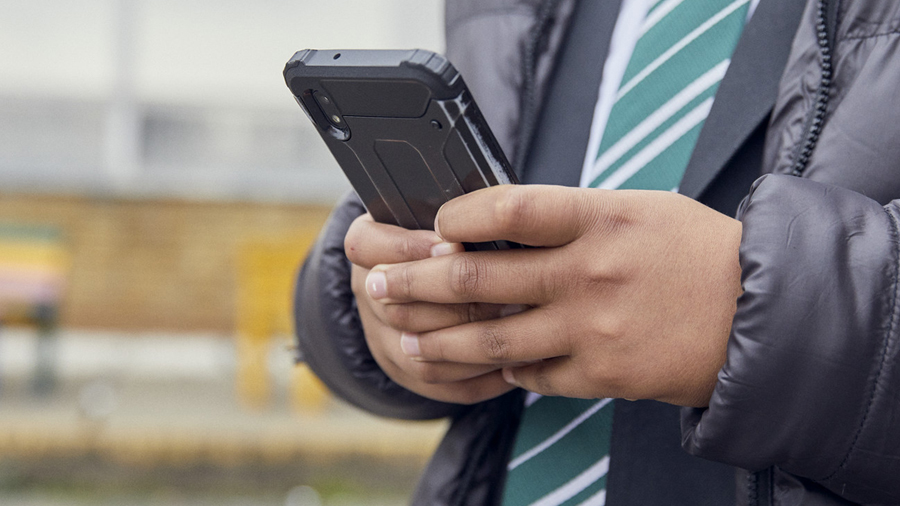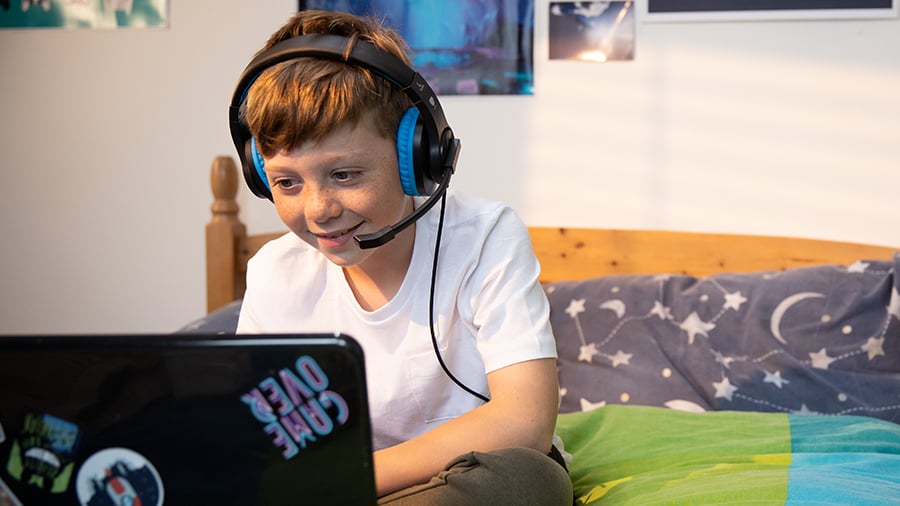What are chat apps?
Chat apps allow the user to send messages, photos, videos and documents, as well as creating large group chats.
Some apps allow users to message people they don’t know, so your child could receive messages from people they don’t know - most apps have settings to allow this to be changed so that they only receive messages from people they know. With your child, make sure these settings are in place and show them how to reject requests from people they don’t know.
Even with friends, your child might see something that upsets them. Explore each app to see if there are reporting and blocking features. Show your child how to use these features and talk about situations when they might want to report or block.
Worried about a child?
Contact our Helpline by calling 0808 800 5000 or emailing [email protected].
Children can contact Childline any time to get support themselves.
Safety settings in chat apps
A risk for children and young people using chat apps is being added to group chats where they don’t know the other people in the group, which could increase the chance they come across upsetting or negative messages.
Many of the chat apps have different privacy settings to help restrict who can contact you. If your child is using a chat app, we'd recommend looking at the privacy settings to see what's most appropriate. If there aren’t any options to restrict contact then we'd recommend that your child doesn’t use the app.
To prevent children being added to groups by people they don't know in WhatsApp, we recommend changing the group chat settings from ‘Everyone’ to ‘My Contacts Except…’ and using the tick icon to select all contacts.
The ‘My Contacts Except…’ option means only your child’s phone contacts, except those you exclude, can add your child to groups. But by selecting all contacts, it means that nobody should be able to add your child to a group chat without first sending them an invitation.
In Kik's privacy settings there's a 'Let Friends Find Me' option, which allows users who already have your contact details to connect with you. This option is turned on by default so make sure to switch this off.
Users of Telegram have privacy settings available to help you manage:
- who can see your phone number
- who can see when you were last online
- your profile photo
- who can call you
- and who can add you to groups and channels
End-to-end encryption

You might have heard about end-to-end encryption, but do you know what it is, and what that means for your child?
End-to-end encryption is where only you and the person or people you’re communicating with can view the messages that have been sent.
The company who runs the messaging service or app can’t view end-to-end encrypted messages, messages won’t be remotely accessible by police or government when preventing crime, and they can’t be seen by hackers. This means that the message privacy is more secure, but also means they can’t be monitored for illegal activity.
One-on-one messages (between you and one other person) or group chat messages (you and multiple people) can be end-to-end encrypted. This can include written messages, photos, videos, voice messages, audio, documents and calls.
A lot of popular apps are automatically end-to-end encrypted, and some are not. What’s most important is how safe your child is on each app, site and game they use, whether it's encrypted or not. This means talking to your child about what they’re sharing, who they’re talking to and how to stay safe.
Randomised chat forums and apps
There are several sites and apps where the main aim is to randomly connect you to other users, this can be via text but also sharing images and videos as well as livestreaming. Many of these sites are designed for adults, however without age verification procedures in place young users can easily gain access.
There is a high risk that children could come across inappropriate or sexually explicit behaviour on this type of platform, as well as young people being contacted by adults they don’t know. Monkey and Omegle are examples of this type of app.
Disappearing messages
Many chat apps now have disappearing message functions. This means that once a message has been viewed, or after a certain amount of time, it will disappear from the recipient's device. This type of message has additional risks for young people:
- This could give young people a false view that it is safe to share more risky content as it will disappear. However, the recipient can still screenshot or record the content before it disappears without the sender’s knowledge or consent.
- Disappearing messages also make it harder to report inappropriate contact or content and makes it more difficult for enforcement agencies to capture evidence of child exploitation or abuse, such as grooming.
- Young people may feel that there is less risk of getting caught using disappearing messages which can encourage peer on peer abuse and bullying.
Different names for disappearing messages include ‘snaps’ and ‘vanishing messages’. They're available on many different apps including WhatsApp, Instagram and Snapchat. Facebook has 'secret convos' that can only be seen on the device they are sent, they will not appear if you log into the account from a different device.
Make sure to talk to your child about what they’re sharing and let them they know they should come to you or another trusted adult if someone sends them something upsetting or worrying. Looking at the reporting and blocking features on the app they use can be very useful for your child too.
Gaming chats

Many gamers use chat apps to connect with other players whilst playing games, or to swap tips and advice with other players in game-specific chats. These chat apps are separate from the gaming platform (such as PlayStation). These chat apps are also used for more than just gaming chat, so it is important to discuss with your child about content they might see or be asked to send and what might happen to content that is shared.
Discord is very popular with gamers. They have a Parent’s Guide and have three main recommendations help keep your child safe using the app.
- Choose a secure, strong password.
- Set who can send you direct messages and friend requests.
- Block inappropriate content.
Whichever app your child uses, look at the settings and go through the steps together to make sure you both understand how to stay safe.
Chat rooms
There are many chat rooms/forums available for specialist topics such as hobbies or interests. There are also chat rooms which are meant just for adults such as sex chat rooms. Children and young people may be curious and want to find out more and as many of these sites don’t have age verification procedures in place it can be easy for a child to access them.
You can use parental controls on your home wifi to restrict access to sites like these. But you should also talk to your child about what is and isn’t appropriate.
Online chat rooms can increase the risk of grooming for sexual abuse. A groomer is someone who makes an emotional connection to try and make someone do what they want, such as:
- have sexual conversations
- send nude images or videos
- meet up in person.
Remember that people can mask their identity online to change their age, gender or pretend to be a coach or public figure. They will likely pay young people lots of compliments or offer things that they want to draw the into conversation. There is lots of information on Childline to help your child be aware and to help keep them safe online.
Many of us talk to people online that we don’t know – it can be a great way to stay connected and to gain information. However, it is important for children and young people to understand the risks of talking to someone they don’t know.
Talk to your child about what they’re sharing
It is important for children and young people to be aware of what they are sharing online and who might see it. It can be helpful to compare it to what they would be happy to share offline.
For example, they shouldn’t give their phone number to someone they didn’t know who approached them on the street, so it’s important to not give it to someone you’ve only met online.
Remind them that they shouldn’t share private things, such as:
- personal information, like emails, names, phone numbers, location and school names
- photos of themselves
- photos of their body, such as sexual photos or videos.
Children and young people should also consider that what they are sharing online may be shared further, to people they don’t know, and they don’t have control once it has been shared.
Popular chat apps
Age rating: 16+
Main features: text, photo & video sharing, one to one and group chats, disappearing messages. End to end encrypted. Live location sharing.
Age rating: 13+
Main features: text chat or video call with strangers.
Age rating: 16+
Main features: text, photo & video sharing, one to one and group chats. End to end encrypted.
Age rating: 13+
Main features: text, call, share photos and send video messages, secret chats. End to end encrypted.
Age rating: 13+
Main features: text, photo & video sharing, one to one and group chats, disappearing messages. End to end encrypted.
Age rating: 13+
Main features: messages, photos, videos and audio recordings, and play games with your Facebook and Instagram friends and phone contacts. You need a Facebook or Instagram account to use Messenger.
Age rating: 13+
Main features: a chat app that's popular with gamers. It is often used to talk to other players while playing games.
Age rating: 13+
Main features: photos, short videos or messages, disappearing messages called Snaps.
Age rating: 13+
Main features: text, photo and video messages one to one or groups. The ‘Meet New People’ feature lets you start a conversation with random users






